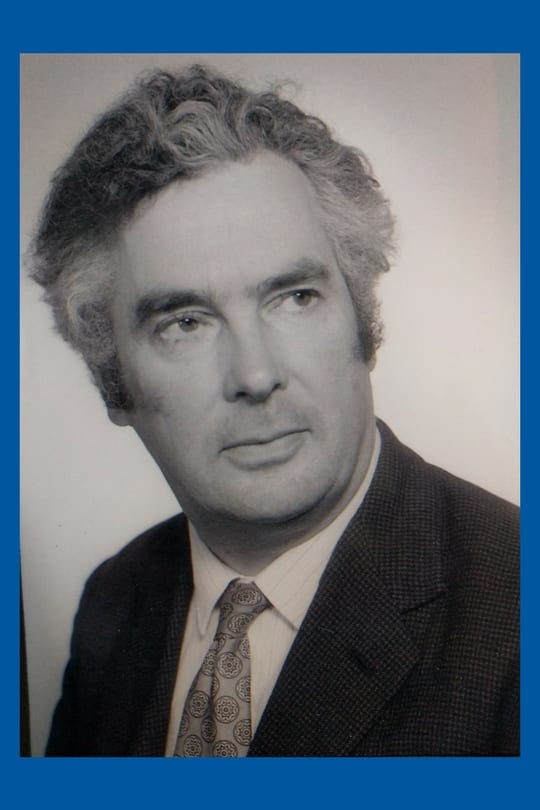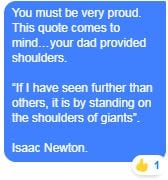On the Shoulders of a Giant
When I heard the news of 50 newspapers in the USA running full page ads against smoking it was a bitter-sweet moment. Let me explain why it was so personal.
My father, Frederick C. Chesterman, was a medical student at the Middlesex Hospital back in the 1940s. To qualify, the students had to do a set number of baby deliveries each, a set number of post mortems, and of course a ton of other stuff.

Dad hated delivering babies! No idea why. However, he found post mortems fascinating. A fellow student was the opposite, so the two decided to trade a few of their consignments. I guess the hospital was so big the consultants didn’t know which student was which, so they got away with it! As a result, the other student got really good at delivering babies and went on to become a gynecologist, while Dad won the pathology prize and his career in pathology was made. He was originally supposed to go out to Africa to follow in the footsteps of his brilliant father, Sir Clement Chesterman, who was a specialist in tropical medicine. The only trouble was, he didn’t want to. I am very glad he didn’t, as he would have always played second fiddle to my grandfather.
Instead, armed with his pathology prize to persuade his reluctant father he was doing the right thing, Dad embarked on a career in pathology, eventually winding up at the Imperial Cancer Research Fund in Mill Hill, London, where he remained for the rest of his life.
It wasn’t long before he and the other doctors there started to see how addictive nicotine was. I remember his experiments with mice, which would be given a dose of cigarette smoke through a pipe. They would all rush over to the pipe as soon as the smoke started coming out, as they had become nicotine addicts. Would the government heed the warning from Dad and his colleagues? No fear! The entire National Health Service in UK was funded by taxes on cigarettes. No way did they want to stop people from smoking and lose all that money. The National Health Service had been brought in after World War II. People saw it as their reward for fighting the Nazis, and compensation for all that they had suffered. The UK government was not going to let the NHS be jeopardized through lack of funding.
As a result, Dad’s message was silenced.
He and his colleagues wrote papers about the dangers of smoking, the link to lung cancer, and the addictiveness of nicotine. These papers, however, fell on deaf ears. The fact that smoking was linked to cancer was not shared with the general public! (They were not the first doctors to point out this link, of course. As early as 1912 Isaac Adler proposed that smoking might be to blame for the growing incidence of pulmonary tumors.)
Instead, Dad devoted much of his free time to giving lectures on the subject. He spoke at schools, with one school then deciding to ban smoking on their premises. He spoke before diverse organizations ranging from women’s institutes to borstals (juvenile prisons). He would tell me about these lectures, which would start with every member of the audience smoking in defiance. Dad just got on with showing his slides of lungs riddled with diseases from smoking. One by one, the cigarettes in the audience went out.
Finally, towards the end of his lecture, he would pull out his trump cards: two vials, one containing a healthy lung, the other a diseased lung from a smoker, black and slimy from the tar, described by those who saw it as “absolutely revolting”. They got passed around the audience. Not a single person was still smoking by the end of Dad’s lecture.
He also got active in anti-smoking organizations such as ASH UK, serving with Yehudi Menuhin as president and vice president; I forget which way round it was. Dad never stopped in his quest to get the message out that smoking was linked to lung cancer. I remember the business cards he had printed: lung cancer cures smoking.
So, when I saw that full page ad in the SF Chronicle on Sunday, Nov 26, announcing that yes, cigarettes really do cause cancer, my first thought was, “if only Dad could have seen this!” Half a century ago he could only dream of such an ad.
It has taken fifty long years and who knows how many more deaths to reach this point. Thank you, ASH USA, for the part you have played, and continue to play, in raising awareness of the dangers of smoking.
But the moment I could no longer hold back the tears was when a friend sent me this on Facebook:

Jane Chesterman Jewell, California








